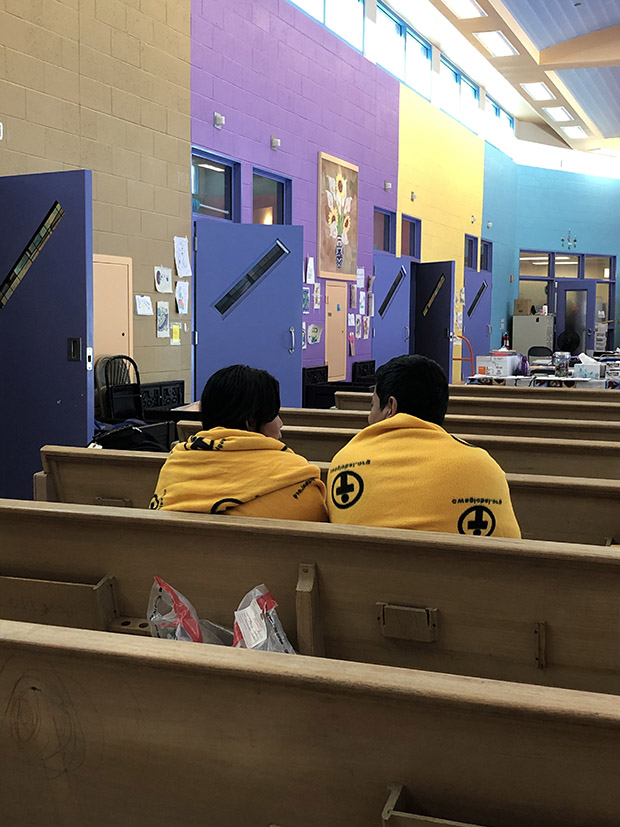One day back in the fall, I was watching as a new group of asylum seekers arrived at the shelter after being released from ICE detention. They came off the ICE bus with their heads hanging low, their few meager belongings clutched in their hands, their children clinging to their legs. They took a seat in the pews and their countenances began to rise at the warm greeting they were given by one of our volunteers. Some volunteers started getting soup ready to serve. Others handed out shoelaces, since asylum seekers’ shoelaces are taken from them in detention.
Things were running smoothly so I turned to head back to my office. That’s when I saw her. Standing near the back of the room was one of the women who had arrived the day before. She was weeping.
I went over to her, concerned. I asked her if she was okay, and if I could help in any way. She told me that seeing the group arrive had just overwhelmed her with emotion. She didn’t know any of them, but yet she knew. She knew what they had gone through to get there. She knew how long the journey had been because she had been through it. I looked back at the group and suddenly saw them through her eyes. And I wept with her.
There has been much that has happened within the last eight months while I have served as a Border Volunteer with the shelter, Casa Alitas. I have had the opportunity to offer volunteer trainings, put together a better volunteer tracking and communication system, oversee interns, and give tours to visitors and groups. While there have been many aspects of my role that I have enjoyed, it always comes back to the people. The guests. They are the ones we do all of this for; they are the reason why I am in this position.
It has been devastating to watch asylum be dismantled over the past year. Now with the coronavirus and the border closing, there are basically no people getting through. The newest laws proposed by the Trump administration would make the end of asylum official. I think about the many guests who have come through our doors and I wonder how anyone could see them as the enemy.
Whenever I have the opportunity, I advocate for our asylum-seeking guests. Prior to the coronavirus, we had groups and out of town visitors who came to tour and serve at Alitas. I loved giving presentations and sharing about the real-life impact of the asylum changes. I always told the visitors that they were our ambassadors. We were sending them back to their corner of the country to be a voice for asylum seekers. We are now trying to find ways to continue being a voice and to train up more advocates, even with social distancing.
A side benefit of this position is all the amazing people I have met. The out of town visitors and the visiting groups, the volunteers with their wealth of experiences, the staff at Alitas. Also people from the shelter network, CWS, UNHCR, Save the Children and UNICEF. There are some really incredible people involved in this work. It gives me hope to see all the people who have been in this fight since long before I have, and who are continuing to fight on despite the odds.
Looking forward, it is hard to predict what to expect. Between the coronavirus and the border closure and now the new proposed laws, there may not be many people coming through. All I know is that the work we do is important. We will continue to do it as much as we can for as long as we can. And I hope that we will never forget why it is we do what we do, even if it sometimes makes us weep.
Sarah M. Reed is a CWS Border Volunteer in Arizona.
In partnership with UNICEF USA and UNHCR, CWS supports organizations like Casa Alitas through our Border Volunteer Corps program. These organizations offer shelter to asylum seekers who are released from detention and reuniting with family members. Border Volunteers serve in border shelters for 11 months. They support shelter staff through daily operations, strengthening systems and volunteer recruitment and orientation. The number of asylum seekers being released has decreased over the past year due to Migrant Protection Protocols—under which the government is returning families to Mexico to await court dates—as well as the coronavirus and border closures, which have remained beyond the pandemic restrictions. Some asylum seekers do continue to be released, and humanitarian border shelters are open and ready to welcome families fleeing violence and seeking refuge.

